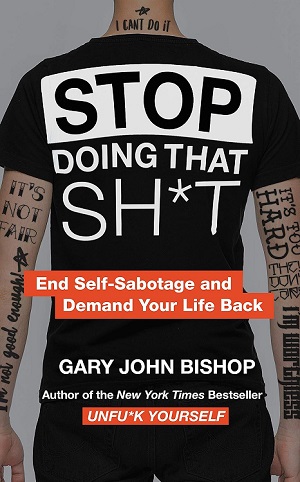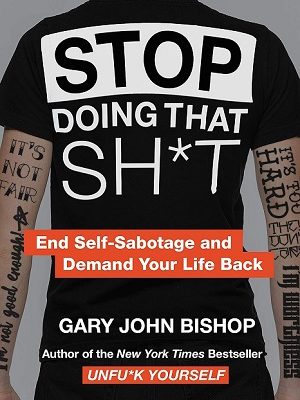Stop Doing That Sh*t: End Self-Sabotage and Demand Your Life Back by Gary John Bishop is a powerful guide that addresses the destructive behaviors and thought patterns that hold people back from reaching their true potential. Bishop, known for his no-nonsense approach, digs deep into the subconscious causes of self-sabotage, offering practical insights on how to overcome these barriers to live a more fulfilling life. Below are the key lessons from the book:

Read: Unfu*k Yourself
1. Self-Sabotage is Rooted in Your Beliefs
One of the core lessons in Stop Doing That Sht* is that self-sabotage arises from deeply ingrained beliefs you hold about yourself, others, and the world. These beliefs are often formed early in life and continue to shape your thoughts and actions unconsciously. Gary John Bishop explains that many people are unaware of these beliefs, but they dictate behaviors that undermine their success.
Key points about self-sabotaging beliefs:
- Beliefs are the foundation of behavior: The way you perceive yourself (your self-image) plays a significant role in your actions. Negative beliefs lead to destructive habits.
- You unconsciously work to confirm your beliefs: If you believe that you are undeserving of happiness or success, you’ll act in ways that ensure you don’t achieve them, reinforcing that belief.
- Challenge your limiting beliefs: To stop self-sabotaging behavior, you need to first become aware of your deep-rooted beliefs and challenge their validity.
Bishop emphasizes that by recognizing and changing these limiting beliefs, you can begin to take control of your life and break the cycle of self-sabotage.
2. You are Not Your Thoughts
Bishop explains that many of the negative thoughts and doubts that people experience come from old programming that doesn’t necessarily reflect who they truly are. He argues that a key to overcoming self-sabotage is realizing that you are not defined by your thoughts.
Key insights include:
- Thoughts are just mental noise: Your mind is constantly producing thoughts, but these do not define who you are. Often, they are just random reflections of past experiences or fears.
- Stop identifying with negative thoughts: When you stop seeing your thoughts as an essential part of who you are, you gain the freedom to act differently and break harmful patterns.
- Take control of your internal dialogue: Becoming aware of negative self-talk allows you to choose how you respond, rather than letting it control your actions.
By learning to disassociate from negative thoughts, you can gain clarity and start to make decisions that align with your true desires and values rather than acting out of fear or insecurity.
3. Your Actions are Driven by the Past
Bishop explains that many self-sabotaging actions are reactions to unresolved past issues. The experiences and traumas you faced growing up shape the way you respond to challenges, often causing you to repeat harmful patterns.
Key lessons about the past and behavior:
- You live according to a script: Many of your current behaviors are scripted by past experiences, meaning you react in ways that were programmed by what happened to you earlier in life.
- You are stuck in old narratives: Unconsciously, you continue to play out stories of failure, rejection, or inadequacy, which leads to self-sabotage.
- Break free from your past: To change your behavior, you need to stop living in the shadow of your past. Recognize that your past experiences do not have to dictate your future actions.
This lesson teaches that by acknowledging the role of past experiences, you can stop repeating old, self-destructive patterns and create a new narrative for your life.
4. Accountability is Key
A crucial lesson in Stop Doing That Sht* is the importance of taking full responsibility for your life. Bishop stresses that blaming external circumstances, other people, or past experiences for your self-sabotaging behavior only keeps you stuck.
Important takeaways about accountability:
- You are responsible for your actions: While external factors may influence you, your choices are ultimately your own. This means you have the power to change your behavior.
- Stop playing the victim: Self-sabotage often involves playing the victim and feeling powerless. Taking accountability shifts you from a mindset of helplessness to one of empowerment.
- Own your life: When you accept full responsibility for both your successes and failures, you gain the freedom to create the life you want.
Bishop encourages readers to stop making excuses and take control of their lives. This shift in mindset is key to breaking free from self-sabotaging behaviors.
5. The Power of Self-Awareness
One of the most important steps in ending self-sabotage is becoming aware of your own behavior and thought patterns. Bishop stresses that self-awareness is the foundation of personal growth.
Key points about self-awareness:
- Become conscious of your patterns: Self-sabotage often happens unconsciously. By paying attention to your thoughts, feelings, and actions, you can begin to identify the patterns that hold you back.
- Question your automatic responses: Self-awareness allows you to interrupt automatic behaviors that are rooted in old habits or beliefs.
- Reflect on your motivations: Ask yourself why you behave the way you do. Are your actions aligned with your true desires, or are they a response to fear, guilt, or shame?
Self-awareness is the first step to making intentional changes. When you can recognize your self-sabotaging tendencies, you can begin to choose different actions that lead to more positive outcomes.
6. Stop Seeking Validation from Others
Bishop highlights the importance of stopping the cycle of seeking approval or validation from others. Many self-sabotaging behaviors stem from the need to be liked, accepted, or validated by external sources, which leads to making decisions that are not aligned with your true self.
Key insights on validation:
- Stop living for others: Trying to meet the expectations of others often leads to self-sabotage because you end up compromising your own needs and desires.
- You are enough as you are: Bishop emphasizes that self-worth comes from within. You don’t need validation from others to feel valuable.
- Live authentically: By letting go of the need for external approval, you can begin to live a life that is true to who you are, rather than one shaped by the expectations of others.
This lesson teaches the importance of being true to yourself and recognizing that your worth is not determined by others’ opinions or validation.
7. Focus on Action, Not Just Understanding
A key message from Stop Doing That Sht* is that understanding why you self-sabotage is only the beginning. The real change comes from taking action. Bishop emphasizes that while self-awareness is important, it must be paired with concrete steps to create lasting change.
Important takeaways about action:
- Action leads to transformation: You can read all the self-help books in the world, but real change only happens when you start acting differently.
- Overcome analysis paralysis: Many people get stuck trying to understand every detail of why they self-sabotage, but this often leads to inaction. Focus on changing your behavior rather than overthinking it.
- Start small: Begin by making small, intentional changes in your daily life. Over time, these small steps lead to significant personal growth.
Bishop urges readers to get out of their heads and start making tangible changes in their behavior. Understanding alone is not enough; action is what drives real progress.
8. Commitment to Change
Finally, Bishop stresses the importance of committing to long-term change. Self-sabotage is a deeply ingrained behavior, and overcoming it requires ongoing effort.
Key lessons on commitment:
- Change takes time: Breaking free from self-sabotaging behaviors is a process that requires consistent effort over time.
- Stay committed to personal growth: Even when it gets difficult, it’s important to remain committed to improving yourself and creating the life you want.
- Embrace discomfort: Growth often comes with discomfort. Be willing to step outside of your comfort zone and face the challenges that come with change.
Bishop teaches that commitment to change is essential for breaking the cycle of self-sabotage and achieving long-term happiness and success.
Conclusion
In Stop Doing That Sht*t, Gary John Bishop offers a tough-love approach to ending self-sabotage. His book emphasizes the importance of self-awareness, accountability, and action, encouraging readers to take full responsibility for their lives and stop letting their past dictate their future. By understanding and breaking free from limiting beliefs and patterns of behavior, individuals can reclaim control and live a more fulfilling, purpose-driven life (Amazon).



